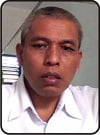Reformulating the Educational Philosophy and Aim of LPTK (Teacher Training Institutions) in Indonesia
Abstract
ABSTRACT: Entering the 21st century, there was a new phenomenon in higher education world in Indonesia, especially for institution of education and teacher training. In 2000, for example, ten IKIPs (Institut Keguruan dan Ilmu Pendidikan or Institute of Education and Teacher Training) in Indonesia changed their names into university. Accordingly, discussing critically educational philosophy and aim in a nation-state is very important and should always be sought for in order to realize the critical society, especially related to the question of how this nation-state will be built. Every nation-state has contextual education philosophy and aim, which is particular in its own historical and social context. Indonesia, as a nation-state, has unique educational philosophy and aim, and it is the next generation’s job to revitalize and implement it in the real educational praxis. This paper tries to discuss the position and role of LPTK (Lembaga Pendidikan Tenaga Kependidikan or Teacher Training Institutions) as one of higher educational institutions that is responsible to educate the professional teachers in Indonesia. It is imperative to reformulate and revitalize the educational philosophy and aim of LPTK, especially related to preparing the candidate of such institution participants — who will be the teachers and educators in the future — in order that educational development in Indonesia can educate the people in one side, and can strengthen self identity in other side as civilized, advanced, modern, prosperous, and social justice nation.
KEY WORDS: National philosophy, educational aim, teacher training institutions, and reformulate the position and role of institution.


About the Authors: Andi Suwirta, M.Hum. is a Senior Lecturer at the Faculty of Social Studies Education UPI (Indonesia University of Education), Jalan Dr. Setiabudhi No.229 Bandung 40154, West Java; and Joko Purwanto, M.Pd. is a Senior Lecturer at the Faculty of Education and Teacher Training UMP (Muhammadiyah University of Purwokerto), Jalan Raya Dukuh Waluh, Purwokerto, Central Java, Indonesia. They can be reached at: aspensi@yahoo.com
How to cite this article? Suwirta, Andi & Joko Purwanto. (2013). “Reformulating the Educational Philosophy and Aim of LPTK (Teacher Training Institutions) in Indonesia” in EDUCARE: International Journal for Educational Studies, Vol.5(2) February, pp.191-200. Bandung, Indonesia: Minda Masagi Press owned by ASPENSI in Bandung, West Java; and FKIP UMP in Purwokerto, Central Java, ISSN 1979-7877.
Chronicle of the article: Accepted (December 27, 2012); Revised (January 30, 2013); and Published (February 17, 2013).
Full Text:
PDFReferences
Burdett, Frank. (1988). “Education Policy Innovation: A Conceptual Approach” in L. Bondy & M.H. Matthews [eds]. Education and Society: Studies in the Politics, Sociology and Geography of Education. London and New York: Routledge.
Djojonegoro, Wardiman. (1995). Lima Puluh Tahun Pendidikan Indonesia, 1945-1995. Jakarta: Depdikbud RI [Departemen Pendidikan dan Kebudayaan Republik Indonesia].
Echols, John M. & Hassan Shadily. (2003). Kamus Indonesia-Inggris: An Indonesian-English Dictionary. Jakarta: Penerbit PT Gramedia, third edition.
Gaffar, Mohammad Fakry. (2003). “Membangun Institusi yang Berbasis Ilmu Pengetahuan dan Akhlak Mulia”. Rector Speech at the 49th Anniversary of UPI (Universitas Pendidikan Indonesia or Indonesia University of Education) in Bandung, West Java, Indonesia: 20th October.
Harefa, Andrias. (2002). Sekolah Saja Tidak Pernah Cukup. Jakarta: PT Gramedia Pustaka Utama.
Hasan, Said Hamid. (1996). Pendidikan Ilmu Sosial. Jakarta: PPTA, Ditjendikti, Depdikbud RI.
Ismaun. (1967). Tindjauan Pantjasila: Dasar Filsafat Negara Republik Indonesia. Bandung: Karya Remadja.
Ismaun. (1969). Problematik Pantjasila sebagai Kepribadian Bangsa Indonesia. Bandung: Karya Remadja.
Ismaun. (1980). Pancasila: Pandangan Hidup Bangsa dan Dasar Negara Republik Indonesia. Bandung: CV Yulianti.
Kartadinata, Sunaryo. (2012). “Institutional Governance Requirements to Produce Dedicated Teachers: Restructuring Teacher Training Institutions towards Efficient and Effective Management”. Available also at: http://file.upi.edu/Direktori/FIP/JUR._PSIKOLOGI_PEND_DAN_BIMBINGAN/195003211974121-SUNARYO_KARTADINATA/Institutional_Governance_%28ENGLISH%29.pdf [accessed in Bandung, Indonesia: 15th January 2013].
Lombard, Denys. (1996). Nusa Jawa Silang Budaya: Kajian Sejarah Terpadu, three Volumes. Jakarta: PT Gramedia Pustaka Utama, Translation.
Maarif, Ahmad Syafii. (1996). Sejarah Pendidikan Islam di Indonesia. Yogyakarta: LP3M.
Ricklefs, M.C. (1991). Sejarah Indonesia Modern. Yogyakarta: Gadjah Mada University Press, Translation.
Smith, Samuel. (1986). Gagasan-gagasan Besar Tokoh-tokoh dalam Bidang Pendidikan. Jakarta: Penerbit Bumi Aksara, Translation.
Somantri, Muhammad Numan. (2001). Menggagas Pembaharuan Pendidikan IPS. Bandung: PT Remaja Rosdakarya.
Supriadi, Dedi [ed]. (2002). Guru di Indonesia: Pendidikan, Pelatihan, dan Perjuangannya Sejak Zaman Kolonial hingga Era Reformasi. Jakarta: Ditjendikdasmen, Depdiknas RI.
Supriadi, Dedi. (1998). Mengangkat Citra dan Martabat Guru. Yogyakarta: Adicita Karya Nusa.
Tilaar, H.A.R.. (2003). Kekuasaan & Pendidikan: Suatu Tinjauan dari Perspektif Studi Kultural. Magelang: Indonesiatera.
Tsuchiya, Kenji. (1986). “Perjuangan Taman Siswa dalam Pendidikan Nasional” in Akira Nagazumi [ed]. Indonesia dalam Kajian Sarjana Jepang: Perubahan Sosial-Ekonomi Abad XIX & XX dan Berbagai Aspek Nasionalisme Indonesia. Jakarta: Yayasan Obor Indonesia, Translation.
Zais, Robert S. (1996). Curriculum: Principles and Foundations. New York: Harper & Row Publishers.
Zulkabir & Andi Suwirta [eds]. (2011). Membangun Pendidikan Guru Tingkat Universitas: Pemikiran Pendidikan dari Mas Sadarjoen Siswomartojo hingga Sunaryo Kartadinata, 1954 — 2015. Bandung: UPI Press and Rizqi Press.
EDUCARE: International Journal for Educational Studies. Ciptaan disebarluaskan di bawah Lisensi Creative Commons Atribusi-BerbagiSerupa 4.0 Internasional
